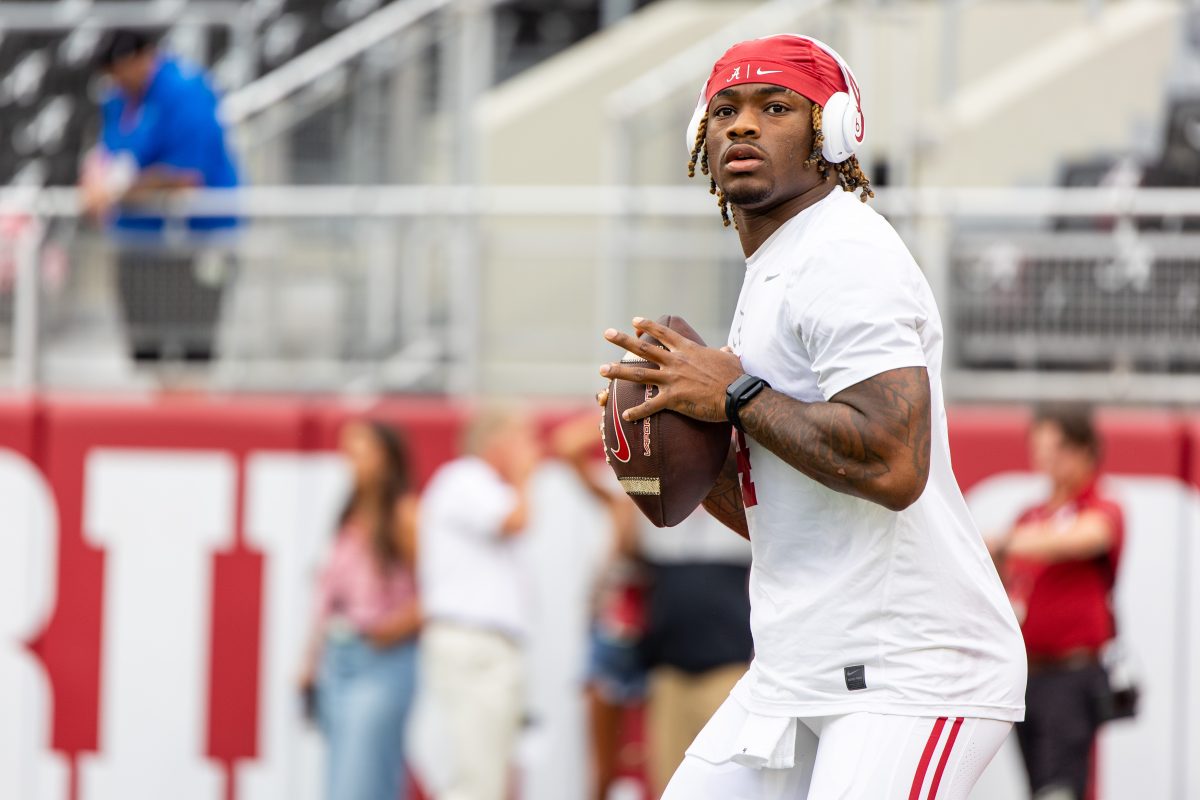At The University of Alabama, football is a cultural cornerstone without which many couldn’t imagine living. This is true to an extent throughout the United States, but especially in Alabama and the surrounding region — as late hall-of-fame Alcorn State coach Marino Casem once put it, “in the South, football is a religion, and Saturday is the holy day.”
What often gets overlooked, however, is that though “football” is synonymous with fans’ and students’ existence, our name for it is remarkably counterintuitive
The feet are of course an important part of playing the sport — they’re necessary for running, and as Alabamians well know, they can change the course of a game entirely when used for kicking field goals — but highlighting them is odd, given that the game is largely played through hand-based functions like throwing and catching. It seems “football” has become a name we’re accustomed to without being attuned to the meaning.
Like many linguistic curiosities, the significance behind the term and its use is murky, and it traces back far beyond even the first game of football as we know it.
In order to properly understand the word, we need to travel back to the inception of the sport and how people referred to it. “Football,” at least in the Western sense — foot-based games like kemari and cuju existed in Japan and China, respectively, as far back as multiple millennia ago — is documented in the Oxford English Dictionary as first occurring in 1409. In the ensuing centuries, its spelling was never truly regularized, being written as “foteball” in 1409, “futball” in 1424, “foote balle” in 1531 and “foote-ball” in 1639. After a couple hundred years as “foot-ball,” it finally stabilized to the “football” form we recognize sometime in the 19th century.
As for the game “football” referred to in all those uses — it varies. Initially, it was used in the sense of what Americans call “soccer”; the top OED definition reads, “Any number of games played between two teams and involving kicking or in some cases handling a ball.” Most key in that terminology is “Any number of games,” a broadness that accounts for the numerous versions of the sport that existed in England in football’s morphologically chaotic early centuries.
There’s debate over whether “football” denoted the games’ use of kicking — a logical deduction — or their status as being played on foot as opposed to on horseback — a distinction that once separated the poor from the horse-sporting nobility. Regardless, many renditions of football were played, with many different sets of rules and regulations.
Most important for our purposes is the evolution of an especially strange variant: rugby. Contemporary legend has it that during an 1823 game of football at Rugby School in Rugby, England, a student named William Webb Ellis violated the traditional rules of the game by picking up the ball and running with it. Although the simple idea of running with the ball in hand instead of only kicking it was likely around long beforehand, the mythical Rugby School occurrence spawned the immensely popular offshoot and eventual independent sport it is today.
From there, we get into the murky historical territory. There’s no way to pin down a singular cross-cultural interaction, but we can generally say that soccer-like football, being so popular in England, spread to and was likewise popular in America.
The same can be said for rugby, or at least a similar hand-based version of football. At least as far back as the early 1800s, Americans wound up playing a hybrid of rugby and football. The terminology from England varied — “Rugby football” distinguished rugby from soccer-like football, and “association football” distinguished soccer-like football from rugby — and it seems that the American game wound up simply blending between the two.
Whatever the semantic process might have been, the end result was that with the first official football game, played between Rutgers and Princeton on Nov. 6, 1869, the naming of the game was simply “football.” Rutgers’ student newspaper, then called “The Targum,” wrote that “Princeton sent twenty-five picked men to play our twenty-five a match game of foot-ball.” A composite collection of the game’s participants was headlined with, “First intercollegiate football game.”
In the time since, the word in the U.S. has become more and more inextricable with the American version of football. The original game of football, which is the most popular and widely played sport in the world, was given the differentiating title of “soccer,” originally British slang for football with its own rabbit-hole etymology and history.
It might not be the most self-explanatory name, but it stuck, and most importantly, it’s ours. Beyond its unique linguistic journey, “football” now has utmost significance for fans across the country, especially the students, alumni and citizens who walk the campus and traverse the Tuscaloosa streets every week, eagerly waiting for Saturday to arrive.
The Crimson White copy desk consists of Chief Copy Editor Luke McClinton and assistant copy editors Lauren Chumbley and Rachel Talley.









